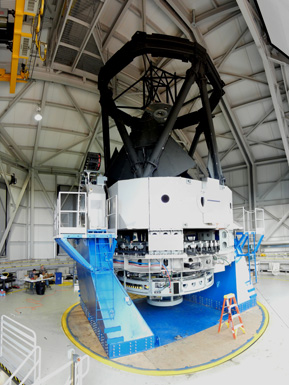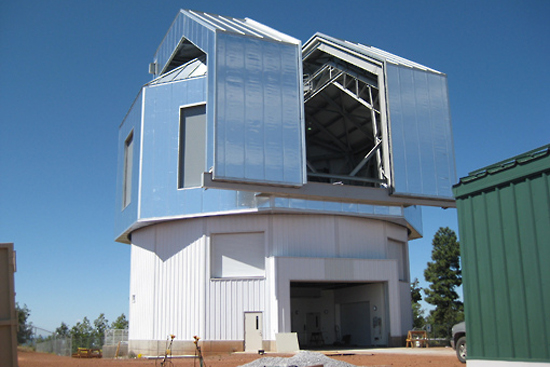BU Astronomers Take a Giant Step Forward
University invests $10 million in state-of-the-art telescope

In a move that Andrew West likens to “going from reading by candlelight to reading by electric light,” BU astronomers will soon be able to view the heavens through the powerful Discovery Channel Telescope, now nearing completion at the Lowell Observatory, near Flagstaff, Ariz.
West, a College of Arts & Sciences assistant professor of astronomy, studies the very faint stars that make up most of the universe, and the new apparatus, he says, will allow him to eye 14 times more of these stars than he did on the much smaller Perkins Telescope, also at the Lowell Observatory, that BU has used since 1998.
Boston University has contributed $10 million of the $53 million cost of the seven-story project in exchange for an agreement that grants BU astronomers use of the telescope for 45 nights each year.
“BU’s investment in this telescope is not only a major boost for our astronomy research and educational programs,” says Andrei Ruckenstein, a BU vice president and associate provost for research, “but it will greatly enhance the impact of our efforts in promoting the understanding of science broadly, in schools, across our own student body, and with the public at large.”
Set in the mountains 40 miles southeast of Flagstaff, the telescope is named for the Discovery Channel, which spearheaded its construction. Astronomers expect it will take several months to work the bugs out of the instrument’s software. The fifth largest telescope of its kind in the continental United States, the Discovery Channel Telescope will be a vast improvement over the Perkins Telescope. The new equipment will enable BU astronomers see more than twice as far into the universe as they had seen, and to view dim objects much more clearly.
“It’s a bit of a game changer,” says West. “This will change people’s mind about BU. It shows us as a large beacon of a science. It shows our commitment to astronomy.”
Until now, BU’s astronomy department has been the only freestanding astronomy department at a major U.S. university without guaranteed access to a telescope of similar capability. BU astronomers who required a bigger instrument than the Perkins had to vie for much-sought-after time at national facilities.
“It was clear that we as an astronomy department had a competitive disadvantage,” says James Jackson, a CAS astronomy professor and associate dean for research and outreach. “Telescopes are essentially our laboratories. We need them just as much as chemists and physicist need labs.”
Jackson says the new agreement will improve the chances that BU research projects will be funded by agencies such as NASA.
It will also help draw top faculty, a concern for the department as a good number of its professors near retirement age, says Alan Marscher, a professor of astronomy. “To attract the brightest young faculty you need a state-of-the-art telescope.”

The agreement with the Discovery Channel gives producers at the channel access to BU research and opens doors for faculty and students in the College of Communication Graduate Program in Science Journalism to produce documentary pieces about research at the telescope for the Discovery Channel.
Under the agreement, BU will pay the $10 million in one-year installments over the next decade. Thereafter, the University will pay $300,000 a year for use of the new telescope, as well as $200,000 a year for continued use of the Perkins Telescope.
Amy Sutherland can be reached at alks@bu.edu.
Comments & Discussion
Boston University moderates comments to facilitate an informed, substantive, civil conversation. Abusive, profane, self-promotional, misleading, incoherent or off-topic comments will be rejected. Moderators are staffed during regular business hours (EST) and can only accept comments written in English. Statistics or facts must include a citation or a link to the citation.